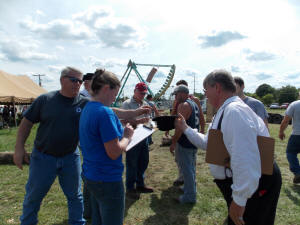 So, is it any wonder that in the "Land of Lincoln" there would be
railsplitting contests. The territory not only includes Illinois,
where Lincoln lived his adult years before heading for Washington,
but in Kentucky, where Lincoln was born, and also in Missouri. So, is it any wonder that in the "Land of Lincoln" there would be
railsplitting contests. The territory not only includes Illinois,
where Lincoln lived his adult years before heading for Washington,
but in Kentucky, where Lincoln was born, and also in Missouri.Now
in the first town named for Abraham Lincoln, you might expect that
there just has to be a railsplitting contest. And, that was what
Railsplitter Festival founder Daris Knauer thought too.
The annual Abraham Lincoln National Railsplitting Contest is
normally in mid-September. This year, a shortage of funds led to the
competition being canceled in May.
But due to some quick thinking of several Logan County Fair board
members, the 43rd annual Abraham Lincoln National Railsplitting
Contest continued with an abbreviated contest during the fair.

How long does it take to split a log into eight rails?
Log splitting definitely depends a lot on muscle, skill and
technique; and somewhat on the particular log. Then there's
something to be said for fortitude and a lot for experience.
The competitors each had logs that were 12 to 14 inches in
diameter and 10 feet in length that were to be split into eight
rails.
Though care is taken in choosing the logs for uniformity, not all
logs are alike and some will be more work, John Sutton pointed out.
Just in the past week he split about 130 rails to be used for
decorative fencing.
To help level the playing field, the logs are all numbered and
positioned on the field. Then competitors go to the field and draw
numbers from a hat. Bob Presswood, a timer, judge and recorder, held
the hat this year, while announcer Heidi Mueller recorded the
results of the lottery.

The competition is kept friendly, and most of the same
competitors come back year and again.
[to top of second column] |

During the championship round, Sutton kept a running commentary
as he simply enjoyed watching each man work. With an experienced
eye, he would comment on the finer nuances with the understanding
that comes from lots of experience, such as if there is a knot in
the wood, if a trunk twists, if there are a few connecting fibers
between rails to whack loose, where to start a wedge -- not at the
end, as the log will split on its own if you start farther up, then
you will need fewer strokes ...
Sutton genuinely appreciated and admired that the youngest and
least experienced splitters stuck with it long after the others were
finished and had worked harder because of their inexperience.
But, you could also see that each log splitter was learning on
this day. They changed what they did as the competition progressed.
"Ah, there he goes. See, he figured that out," Sutton commented one
time. It was especially clear that the younger fellas will be much
better at it the next time out.
Eight competitors entered the championship contest on Sunday
afternoon in an effort to claim one of five places.
This year's first place winner was Chris
Friedlein. It was his 12th win. He took the top spot in 1983, '88,
'94, '95, 2000, '03, '04, '05, '07, '10 and 2012.

Results of the championship round are
in order of five top places, with the time, competitor and the award
sponsor:
-
16:19.21, Chris
Friedlein, Gibson City -- Graue Chevrolet
-
18:35.34, Roy
Usery, Des Arc, Mo. -- Xamis Ford
-
19:05, Tyler
Pritchard, Bloomington -- Town and Country Bank
-
27:28, Cody
Friedlein; Shirley -- Rohlfs Implement
-
29:10, Jonathon Norin; Arrowsmith
Also participating were Scott Friedlein, Tolono; Kyle Friedlein,
LeRoy; and Evan Coombs, Bloomington.
[LDN] |